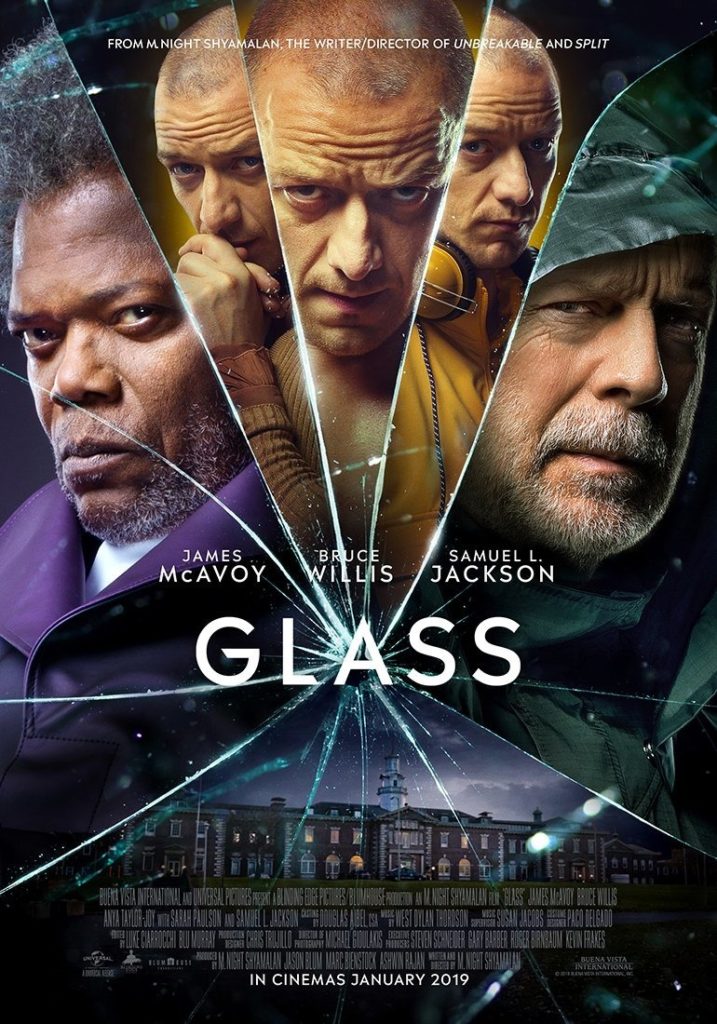It’s hard to believe that a trilogy from M. Night Shyamalan has come full circle, and that it stemmed from his first movie, Unbreakable. Back then, fans did not view films about vigilantes and villains as the type of movies that would play a pivotal role in the future of Hollywood (unless you made a vigilante movie centered around Batman). But boy have things changed since Bruce Willis’ David Dunn put on the rain slicker and saved the day in Unbreakable. After connecting the universe of Unbreakable with 2017’s Split, Shyamalan is back to give us the conclusion to this story of heroes and villains set in the City of Brotherly Love. While Glass may be the weakest of the Unbreakable trilogy and is certain to create watercooler talk about its twists, it offers a unique spin on the perception of comic book stories. Either way, Glass will satisfy fans of the characters from this trilogy despite its cracked structure.
M. Night Shyamalan brings together the narratives of two of his standout originals—2000’s Unbreakable, from Touchstone, and 2017’s Split, from Universal—in one explosive, all-new comic-book thriller: Glass. From Unbreakable, Bruce Willis returns as David Dunn as does Samuel L. Jackson as Elijah Price, known also by his pseudonym Mr. Glass. Joining from Split are James McAvoy, reprising his role as Kevin Wendell Crumb and the multiple identities who reside within, and Anya Taylor-Joy as Casey Cooke, the only captive to survive an encounter with The Beast. Following the conclusion of Split, Glass finds Dunn pursuing Crumb’s superhuman figure of The Beast in a series of escalating encounters, while the shadowy presence of Price emerges as an orchestrator who holds secrets critical to both men.
Taking place three weeks after the events of Split, Glass doesn’t waste much time reintroducing audiences to David Dunn (Bruce Willis) and Kevin Wendell Crumb (James McAvoy) or where they are at the moment and eventually clash. But then, the story takes another direction when we’re introduced to Dr. Ellie Staple (played by Sarah Paulson), who tries to get into the heads of Glass’ main characters when the movie stakes its place firmly in one setting for the majority of the movie. It’s here where audience’s mileage will vary. Playing more like a psychological drama than a comic book thriller, Shyamalan (as usual) presents the audience a few ideas and twists that will leave viewers either intrigued or frustrated. However, you might perceive that Glass gets cooped up in its story and runs about 20 minutes too long as a result. It’s not necessarily dull at any point, but the ideas and themes presented to the audience are driven into your skull more than once when the movie could have used something else, like more action or thrills.
While Glass might not be everything fans were hoping for, its three main characters are the reason why Glass is more than worth the price of admission. James McAvoy’s Kevin Wendell Crumb is still the best role the young actor has ever played, and he even presents more personalities to us this time around; quite frankly, Kevin Wendell Crumb is one of the best characters I’ve seen in a movie, or series of movies, in years. Bruce Willis is back as the silent badass in a rain slicker, David Dunn; it’s just good to see this veteran actor in something decent for the first time since who knows how long. And Samuel L. Jackson is back as Elijah Price (or Mr. Glass) because we know Jackson can’t last more than two months without being in a movie (see you again in March). Glass is at its best whenever any one of the three stars come into contact with one another.
Shyamalan’s legacy revolves around his fondness for twisting his stories and giving us the unexpected. How this has either helped or damaged his reputation given the number of high and low movies he has made is another discussion for another day. However, what Shyamalan does with Glass almost makes the movie come off as an anti-comic book movie, which is certainly refreshing given how many of those are exactly alike. Glass is a bit of a letdown considering how good Unbreakable and Split are, and unfortunately, that may have some people saying, “The bad Shyamalan is back again.” But that isn’t the case with his latest movie here. Sure, it might be a small step back, but I it leaves me looking forward to Shyamalan’s next movie, so how can that be anything but good? As the conclusion to the Unbreakable trilogy, Glass is enough to give closure to these characters that fans have obsessed over through the years–like fans of actual comic book characters.
Glass has its cracks, but nothing that should cause critics or fans to throw any stones.
Rating: [star rating=”3″]





